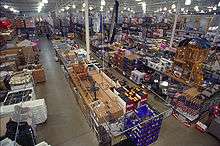Warehouse club

A warehouse club is a retail store, usually selling a wide variety of merchandise, in which customers may buy large, wholesale quantities of the store's products, which makes these clubs attractive to both bargain hunters and small business owners. The clubs are able to keep prices low due to the no-frills format of the stores. In addition, customers may be required to pay annual membership fees in order to shop.
The concept is similar to the consumers' cooperative supermarkets found in Europe, though using bigger stores and not co-operatively owned. The use of members' prices without co-operative ownership is also sometimes used in bars and casinos.
History

In 1971, the Great Atlantic and Pacific Tea Company (A&P) opened their very first Warehouse Economy Outlet (WEO), a warehouse format that only lasted a few years.[1] Sol Price founded FedMart in 1954, an early US discount store. Sol and his son Robert Price founded Price Club in San Diego in 1976 as their first warehouse club. In 1982, discount pioneer John Geisse founded The Wholesale Club of Indianapolis, which he sold to Sam's Club in 1991.[2]
In 1983, Costco Wholesale, Kmart's Pace Membership Warehouse (later sold to Sam's Club), and Sam's Club started operations. BJ's Wholesale Club was started in 1984 by former The Wholesale Club executives and owned by Zayre.
As of 2010, three warehouse club chains operate in the United States. Costco and Sam's Club are the largest chains. Sam's Club, a division of Walmart, claims a membership base of 47 million persons and 602 stores across the United States.[3] Costco has locations in seven other nations including Canada, Mexico, the United Kingdom, Japan, Korea, Taiwan and Australia. BJ's Wholesale Club is one of the smaller competitor with stores located primarily in the Eastern United States.
Examples
- Costco, operates in the U.S., Canada, Mexico, the UK, Australia and other countries
- Sam's Club, operates in the U.S., Mexico and other countries
- BJ's Wholesale Club, operates in the U.S. only
- Makro, operates in Europe, South Africa, Pakistan and other places; previously operated in the U.S., Venezuela & the Philippines.
- PriceSmart, operates in Central America and Caribbean
- City Club, operates in Mexico only
- Wholesale Club, operates in Canada only
Defunct
- American Wholesale Club (1986–1989)
- Buyers Club, a Denver-based independently owned chain
- Club Wholesale, turned into office supplies stores, then folded
- Fedco, bankruptcy in 1999 (most stores bought up by Target Stores)
- GEM & GEX Membership Department Stores (required Membership like a Warehouse Club)
- Gemco, 1959 - 1986, owned by Lucky Stores
- HomeClub, a home improvement warehouse, later became HomeBase and then folded in 2000
- Max-Club, owned by SuperValu (United States)
- PACE Membership Warehouse, owned by Kmart, merged with Sam's Club
- Price Club, merged with Costco
- Price Savers Wholesale Club, merged with PACE Warehouse Club, then merged with Sam's Club
- Sam's Club in Canada
- SourceClub, owned by Meijer
- Super Saver, merged with Sam's Club (Southeast US)
- The Wholesale Club, merged with Sam's Club
- Titan Warehouse Club Inc., an early warehouse concept in Canada (Toronto/Kitchener/Stoney Creek) areas in the 1980s-1990s
- Warehouse Club, was a public company
Alcohol sales without a membership in the U.S.
Many jurisdictions prohibit the discounting of liquor for promotional reasons, meaning that even in warehouse clubstores, members and non-members will pay the same price. Several examples in the United States are included below:
See also
References
External links
 Media related to Wholesale clubs at Wikimedia Commons
Media related to Wholesale clubs at Wikimedia Commons